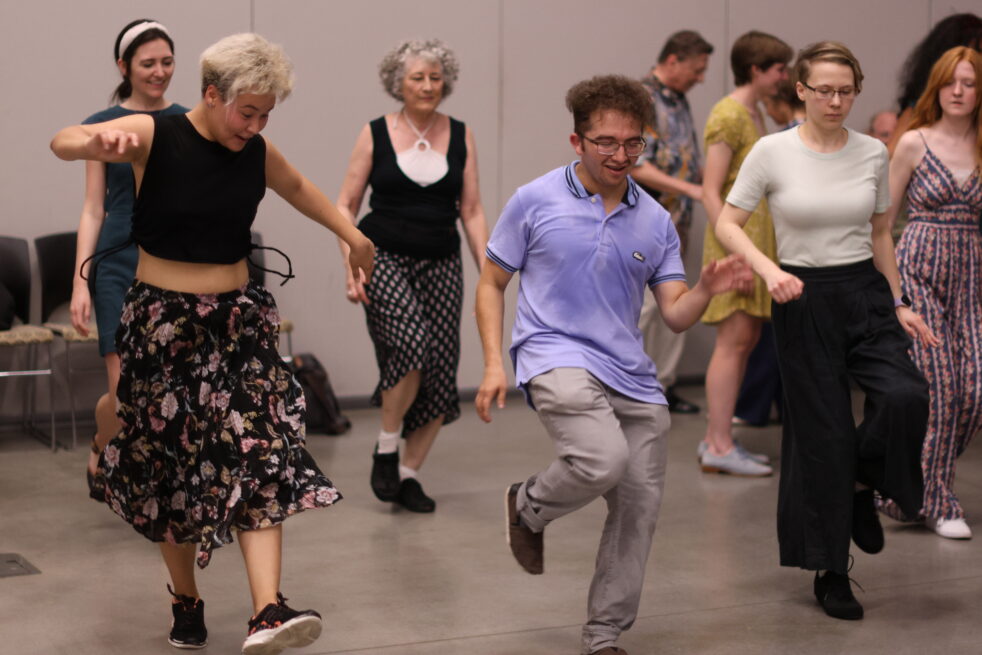The Georgia Tech Dance Association (GTDA) is starting the school year in full swing! This upcoming April will commemorate the club’s 25th anniversary at Tech. Their first dance of the year took place on Aug. 25th, with live accompaniment from Gwen Hughes and the Retro Jazz Kats.
First appearing on the scene in the 1920s, swing dance origins can be traced back to various African American communities. Many of its elements, such as the fast footwork, being set to jazz music and looser clothing on the dancer, emulated the spirit of what we now recognize as the Roaring Twenties.
During its time of peak popularity into the 1940s, there were hundreds of styles of swing dance, but popular styles still seen today include the Swing, Charleston, Lindy Hop and Balboa. Swing dance officially found its footing on Tech’s campus in 1999 with the creation of the GTDA.
McKay Moore, MS CS, the current president, recounts the unique history and longevity of the organization.
“Ever since, it’s been going strong, until Covid … a couple friends and I just liked dancing and wanted people to dance at Georgia Tech again. So we went looking for the old founders, and we found them and asked them what we can do to get the club started and here we are!” Moore said.
Unlike other dance clubs or associations on campus, the GTDA is a social club, meaning there are no competitions, performances or auditions to join and become a member. They provide lessons beforehand and weekly with their own dance instructors as well.
“Swing dance is a partner dance, so people learn very simple basics which you can usually learn in about an hour. Think like 20s, 30s, 40s, like what those people did to have fun. A band will come, they play a song, then you go walk up to someone and if you have a match you dance together. It’s very much a social thing where everybody goes and dances with each other,” Moore said.
GTDA’s presence also extends far beyond the campus borders.
“The Atlanta swing dance community is very strong, and GTDA throughout most of its 25 year period was home…it’s a staple in the Atlanta swing dance community. We have a lot of well-known dancers who, on their national tours, stop by Georgia Tech and dance with us,” Moore said.
GTDA’s monthly social dances are open for general public admission and include special features like live music and a complimentary dance lesson.
Moore explains the lengthy process that goes on behind the scenes of setting up such an event. “The process starts a year in advance, we try to set the dates as soon as possible because it’s very difficult to book spaces at Georgia Tech. Once we plan it, about two to three months in advance we try to start chatting with bands and seeing which one we want to book and we start chatting with instructors, so we bring in professional guest instructors … and then we make all the advertising materials and start advertising about two weeks in advance,” Moore said.
The dances put on by GTDA bring around 300 people every month to Tech’s campus, but there are significant difficulties that can be created by hosting such a large event.
Moore expresses that the biggest challenge with the administration is the expense of booking spaces.
“I really don’t understand why we’re charged so much for a space from our own university … in 25 years, we had to raise prices for the first time for this dance,” Moore said.
According to Moore, this event at the Exhibition Hall will cost them between at least $600-800 for the space itself.
Regarding the aspiration of such a club at Tech, Moore said, “we think it’s an excellent way to decompress and exercise. It’s like a little three minute vacation from the rest of life. We think that it’s really helpful in lots of other ways … it’s a great outlet. Our mission for the club is to create a stable home where people can do that.”
As much as Tech continues to evolve, GTDA and their social dances magnifies the enduring joy and value in music, dance and shared experiences.
As an open and accessible club, attending a dance can be a great opportunity for Jackets looking to meet new people from on and off campus, while learning something new.
